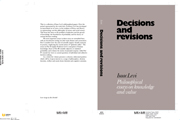Book contents
- Frontmatter
- Contents
- Preface
- PART I Cognitive decision making
- 1 Must the scientist make value judgements?
- 2 On the seriousness of mistakes
- 3 Corroboration and rules of acceptance
- 4 Deductive cogency in inductive inference
- 5 Information and inference
- 6 Epistemic utility and the evaluation of experiments
- 7 Abduction and demands for information
- PART II Knowledge and ignorance
- PART III Chance and surprise
- PART IV Decision making
- Bibliography of Isaac Levi
- Bibliography
- Index of names
- Index of subjects
3 - Corroboration and rules of acceptance
Published online by Cambridge University Press: 26 March 2010
- Frontmatter
- Contents
- Preface
- PART I Cognitive decision making
- 1 Must the scientist make value judgements?
- 2 On the seriousness of mistakes
- 3 Corroboration and rules of acceptance
- 4 Deductive cogency in inductive inference
- 5 Information and inference
- 6 Epistemic utility and the evaluation of experiments
- 7 Abduction and demands for information
- PART II Knowledge and ignorance
- PART III Chance and surprise
- PART IV Decision making
- Bibliography of Isaac Levi
- Bibliography
- Index of names
- Index of subjects
Summary
According to Popper (1959), ‘the doctrine that degree of corroboration or acceptability cannot be a probability is one of the most interesting findings in the philosophy of knowledge’. Unfortunately, the debate that raged a few years ago between Popper and the apologists for Carnap made the significance of Popper's thesis depend upon a determination of who had explicated what presystematic concept adequately (Bar-Hillel, Carnap, Popper, 1955–7). Taking Popper's ‘finding’ to be a gambit in a version of ‘button, button, who has the button’ hardly makes it ‘interesting’. The philosophical importance (if any) of Popper's thesis should be evaluated in terms of the success with which Popper can apply his measure of corroboration to the problems he designed this measure to handle and the philosophical significance of these problems.
Popper's writings offer ample evidence of his intention to formulate rules for accepting and rejecting scientific hypotheses with the aid of his corroboration measures:
Furthermore, the degree of confirmation is supposed to have an influence upon the question whether we should accept, or choose, a certain hypothesis x, if only tentatively; a high degree of confirmation is supposed to characterize a hypothesis as ‘good’ (or ‘acceptable’), while a disconfirmed hypothesis is supposed to be ‘bad’
(Popper, 1959).This passage not only indicates that Popper considers degree of corroboration relevant to formulating acceptance rules but suggests a general acceptance rule:
Given a set of mutually incompatible hypotheses choose that hypothesis with the maximum degree of corroboration relative to the available evidence.
Information
- Type
- Chapter
- Information
- Decisions and RevisionsPhilosophical Essays on Knowledge and Value, pp. 34 - 41Publisher: Cambridge University PressPrint publication year: 1984
